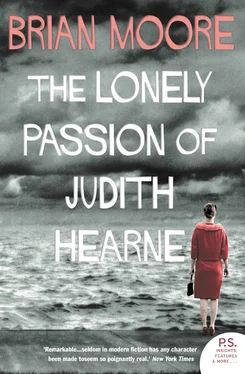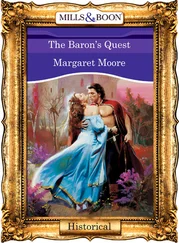BRIAN MOORE
The Lonely Passion of Judith Hearne

Copyright Copyright Dedication Chapter 1 Chapter 2 Chapter 3 Chapter 4 Chapter 5 Chapter 6 Chapter 7 Chapter 8 Chapter 9 Chapter 10 Chapter 11 Chapter 12 Chapter 13 Chapter 14 Chapter 15 Chapter 16 Chapter 17 Chapter 18 Chapter 19 Chapter 20 P.S. Ideas, Interviews & Features … About the Author Prodigal Son: A biographical sketch of Brian Moore About the Book Writing Judith Hearne The Invisible Man Read On Have You Read? If You Loved This, You Might Like … About the Author By the Same Author About the Publisher
Harper Perennial
An imprint of HarperCollins Publishers 77–85 Fulham Palace Road Hammersmith London W6 8JB
www.harpercollins.co.uk
Previously published in paperback by Grafton Books 1965
(reprinted eleven times) and by Flamingo 1994 (reprinted eleven times)
First published in Great Britain by André Deutsch Ltd 1955
Copyright © Brian Moore 1955
PS Section copyright © Sarah O’Reilly 2007
PS™ is a trademark of HarperCollins Publishers Ltd
The publisher asserts Brian Moore’s moral right to be identified as the author of this work
A catalogue record for this book is available from the British Library
This novel is entirely a work of fiction. The names, characters and incidents portrayed in it are the work of the author’s imagination. Any resemblance to actual persons, living or dead, events or localities is entirely coincidental.
All rights reserved under International and Pan-American Copyright Conventions. By payment of the required fees, you have been granted the nonexclusive, nontransferable right to access and read the text of this ebook on screen. No part of this text may be reproduced, transmitted, downloaded, decompiled, reverse engineered, or stored in or introduced into any information storage and retrieval system, in any form or by any means, whether electronic or mechanical, now known or hereinafter invented, without the express written permission of HarperCollins e-books.
HarperCollins Publishers has made every reasonable effort to ensure that any picture content and written content in this ebook has been included or removed in accordance with the contractual and technological constraints in operation at the time of publication.
Source ISBN: 9780007255610
Ebook Edition © JULY 2012 ISBN 9780007405909
Version: 2014–07–11
To Jacqueline
Cover
Title Page
Copyright
Dedication
Chapter 1
Chapter 2
Chapter 3
Chapter 4
Chapter 5
Chapter 6
Chapter 7
Chapter 8
Chapter 9
Chapter 10
Chapter 11
Chapter 12
Chapter 13
Chapter 14
Chapter 15
Chapter 16
Chapter 17
Chapter 18
Chapter 19
Chapter 20
P.S. Ideas, Interviews & Features …
About the Author
Prodigal Son: A biographical sketch of Brian Moore
About the Book
Writing Judith Hearne
The Invisible Man
Read On
Have You Read?
If You Loved This, You Might Like …
About the Author
By the Same Author
About the Publisher
The first thing Miss Judith Hearne unpacked in her new lodgings was the silver-framed photograph of her aunt. The place for her aunt, ever since the sad day of the funeral, was on the mantelpiece of whatever bed-sitting-room Miss Hearne happened to be living in. And as she put her up now, the photograph eyes were stern and questioning, sharing Miss Hearne’s own misgivings about the condition of the bedsprings, the shabbiness of the furniture and the run-down part of Belfast in which the room was situated.
After she had arranged the photograph so that her dear aunt could look at her from the exact centre of the mantelpiece, Miss Hearne unwrapped the white tissue paper which covered the coloured oleograph of the Sacred Heart. His place was at the head of the bed. His fingers raised in benediction. His eyes kindly yet accusing. He was old and the painted halo around His head was beginning to show little cracks. He had looked down on Miss Hearne for a long time, almost half her lifetime.
The trouble about hanging the Sacred Heart, Miss Hearne discovered, was that there was no picture hook in the right place. She had bought some picture hooks but she had no hammer. So she laid the Sacred Heart down on the bed and went to the bay window to see how the room looked from there.
The street outside was a university bywater, once a good residential area, which had lately been reduced to the level of taking in paying guests. Miss Hearne stared at the houses opposite and thought of her aunt’s day when there were only private families in this street, at least one maid to every house, and dinner was at night, not at noon. All gone now, all those people dead and all the houses partitioned off into flats, the bedrooms cut in two, kitchenettes jammed into linen closets, linoleum on the floors and ‘To Let’ cards in the bay windows. Like this house, she thought. This bed-sitting-room must have been the master bedroom. Or even a drawing-room. And look at it now. She turned from the window to the photograph on the mantelpiece. All changed, she told it, all changed since your day. And I’m the one who has to put up with it.
But then she shook her head to chase the silly cobwebs from her mind. She walked across the room, inspecting the surface. The carpet wasn’t bad at all, just a bit worn in the middle part, and a chair could be put there. The bed could be moved out an inch from the wall to hide that stain. And there on the bed was the Sacred Heart, lying face down, waiting to be put up in His proper place. Nothing for it, Miss Hearne said to herself, but to go down and ask the new landlady for the loan of a hammer.
Down she went, down the two flights of stairs to the kitchen, which was used as a sitting-room by Mrs Henry Rice. She knocked on the curtained door and Mrs Henry Rice drew the edge of the curtain aside to peek through the glass before she opened the door. Miss Hearne thought that a little rude, to say the least.
‘Yes, Miss Hearne?’
Beyond the open door Miss Hearne saw a good fire in the grate and a set of china tea things on the table.
‘I wondered if you had a hammer you might lend me. It’s to put up a picture, you know. I’m terribly sorry to be troubling you like this.’
‘No trouble at all,’ Mrs Henry Rice said. ‘But I have a head like a sieve. I never can remember where I put things. I’ll just have to think now. Listen, why don’t you come in and sit down? Maybe you’d like a cup of tea. I just wet some tea this minute.’
Well, that really was a nice gesture to start things off. Very nice indeed. ‘That’s very kind of you,’ Miss Hearne said. ‘But I hate to put you out like this, really I do. I only wanted to put my picture up, you see.’
But as she said this she advanced across the threshold. It was always interesting to see how other people lived and, goodness knows, a person had to have someone to talk to. Of course, some landladies could be friendly for their own ends. Like Mrs Harper when I was on Cromwell Road and she thought I was going to help her in that tobacconist business. Still, Mrs Henry Rice doesn’t look that type. Such a big jolly person, and very nicely spoken.
The room was not in the best of taste, Miss Hearne saw at once. But cosy. Lots of little lace doilies on the tables and lamps with pretty pastel shades. There was a big enamel china dog on the mantelpiece and a set of crossed flags on the wall. Papal flags with silver paper letters underneath that said: EUCHARISTIC CONGRESS DUBLIN. That was in 1932, in the Phoenix Park, Miss Hearne remembered, and my second cousin, once removed, sang in the choir at High Mass. Nan D’Arcy, God rest her soul, a sudden end, pleurisy, the poor thing. John McCormack was the tenor. A thrilling voice. A Papal count.
Читать дальше













